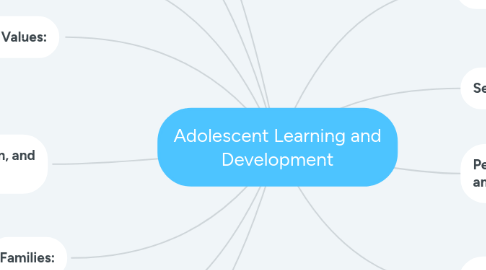
1. Families:
1.1. adolescents relationships
1.1.1. sibling relationship
1.1.1.1. changing in family
1.1.1.1.1. changing society
2. Gender:
2.1. Biological, Social, Cognitive influences on gender
2.1.1. gender sterotypes
2.1.1.1. gender role classification
2.1.1.1.1. developmental changes
3. Cognitive Development:
3.1. the brain
3.1.1. cognitive developmental view
3.1.1.1. information processing view
3.1.1.1.1. social cognition
4. The Self Identity, Emotion, and Personality:
4.1. the self
4.1.1. identity
4.1.1.1. emotional development
4.1.1.1.1. personality development
5. Moral Development, Values:
5.1. moral development and what it means
5.1.1. domains of moral development
5.1.1.1. contexts of moral development
5.1.1.1.1. devlopement of values, religion, and spirituality
6. Achievement, Work, and Careers:
6.1. work and career development
7. Schools:
7.1. approaches and strategies for educating students
7.1.1. transitions in schooling
7.1.1.1. the social contexts of school
7.1.1.1.1. exceptional adolescents
8. Practicum at Joyce Kilmer Middle School:
8.1. learned how to relate to adolescent students
8.1.1. being an authority figure
8.1.1.1. benefits of one on one tutoring
8.1.1.1.1. Parc or state exam preparation
9. Bloom's Taxonomy:
9.1. Create
9.1.1. Evaluate
9.1.1.1. Analyze
9.1.1.1.1. Apply
10. Puberty, Health, and biological Foundations:
10.1. Puberty
10.1.1. Health
10.1.1.1. Enviornment
10.1.1.1.1. Heredity
11. Sexuality:
11.1. exploring adolescent sexuality
11.1.1. sexual attitude
11.1.1.1. problematic sexual outcomes in adolescence
12. Peers, Romantic Relationships, and Lifestyles:
12.1. exploring relationships and friendships
12.1.1. adolescence groups
12.1.1.1. gender and culture

